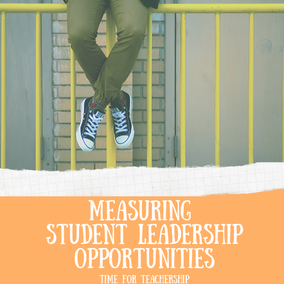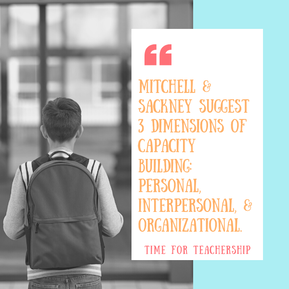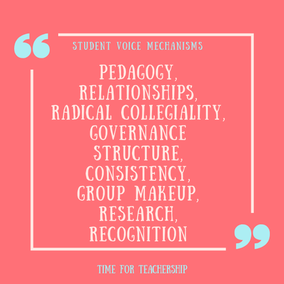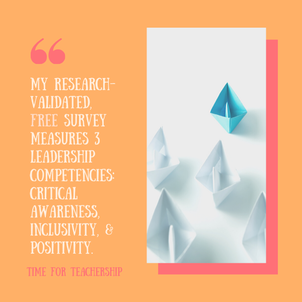|
In a previous post, I highlighted research demonstrating the value of student voice, and specifically, student leadership, for individual student growth and for the growth of the school. This post focuses on how schools can measure students’ perceptions of the available leadership opportunities in their schools. I have developed and validated a measurement tool for schools to assess the presence, or perceived presence, of student leadership opportunities, and at the bottom of this post, I share it with you as a ready-to-use Google Form completely for free! Before I share the link with you, I’ll explain exactly what it measures. 3 Levels of Capacity-Building The three main sections of the form are based on Mitchell & Sackney’s (2011) three dimensions of capacity building, which include: personal capacity building, defined as building individual student skills; interpersonal capacity building, defined as students working with teachers to make school decisions; and organizational capacity building, defined as involving the school culture, structures, and ways of communicating. 8 Voice-Fostering Mechanisms After synthesizing the existing research on student voice, I identified 8 mechanisms (specific practices or structures) that scholars have identified as having the potential to improve the success of student voice initiatives in schools. I organize these within under the umbrellas of the 3 levels of capacity-building. Personal capacity building includes the pedagogy mechanism, or how information is conveyed and made accessible to all students. Interpersonal capacity building contains the mechanisms of relationship building between youth and adults as well as radical collegiality, defined as “an expectation that teacher learning is both enabled and enhanced by dialogic encounters with their students in which the interdependent nature of teaching and learning and the shared responsibility for its success is made explicit” (Fielding, 2001, p. 130). Basically, working in partnership with students and being willing to learn from them. Organizational capacity building includes the mechanisms of: governance structure (a school’s formal system of decision-making and where students fit into it); consistency (holding meetings at the same time and place); group makeup (smaller groups with an even youth:adult ratio are best); research (and it’s role in informing decision-making, often through participatory action research); and recognition (acknowledging and compensating students for their leadership work). 3 Leadership Competencies When we talk about student leadership, we often use the term generically, but there is a ton of relevant literature from the adult leadership world (and some emerging student leadership scholarship) that can help us address the often un-asked question: What kind of leadership? The survey I’m sharing with you measures 3 leadership skills or competencies: critical awareness, inclusivity, and positivity, which stem from authentic, social justice, inclusive, and positive leadership theories. Critical awareness is the skill of reflecting on, understanding, and questioning positive and negative attributes of one’s self and society in order to foster equity and growth. (informed by Preskill & Brookfield’s 2009 and Walumbwa, Avolio, Gardner, Wernsing, & Peterson, 2008.) Inclusivity is the skill of enabling all members to fully participate and learn from each other (adapted from Booysen’s 2013 definition). Positivity is the skill of applying a strengths-based lens to facilitate growth and enable flourishing (based on Cameron’s 2012 principles of positive leadership). For more details on the research behind the validated survey, you can read the original dissertation study here or look for the much shorter, forthcoming journal article being published in AERA Open. How do I use the survey? Get free access to the survey by clicking the button below. Once you’re in, you’ll have access to a Google Drive folder that will enable you to right click on the survey file and “Make a Copy” for yourself. From there, this is yours! You can edit the introduction so it reflects your school’s context, purpose, and spirit. Double-check the setting to make sure it will NOT collect student emails. (We want it to be anonymous!) Then, share the link with students to complete. After you have collected the data, consider setting up a meeting with adult and youth stakeholders to discuss the trends and brainstorm possible next steps. You may also want to hold single stakeholder focus groups to get more detailed explanations of the results before bringing different stakeholders into a shared debrief and action planning space. If you use this tool, my researcher brain would love to hear what trends you find. I also consult with schools who want support in improving their survey results, so if you’re interested, get in touch!
0 Comments
Leave a Reply. |
Details
For transcripts of episodes (and the option to search for terms in transcripts), click here!
Time for Teachership is now a proud member of the...AuthorLindsay Lyons (she/her) is an educational justice coach who works with teachers and school leaders to inspire educational innovation for racial and gender justice, design curricula grounded in student voice, and build capacity for shared leadership. Lindsay taught in NYC public schools, holds a PhD in Leadership and Change, and is the founder of the educational blog and podcast, Time for Teachership. Archives
May 2024
Categories |





 RSS Feed
RSS Feed